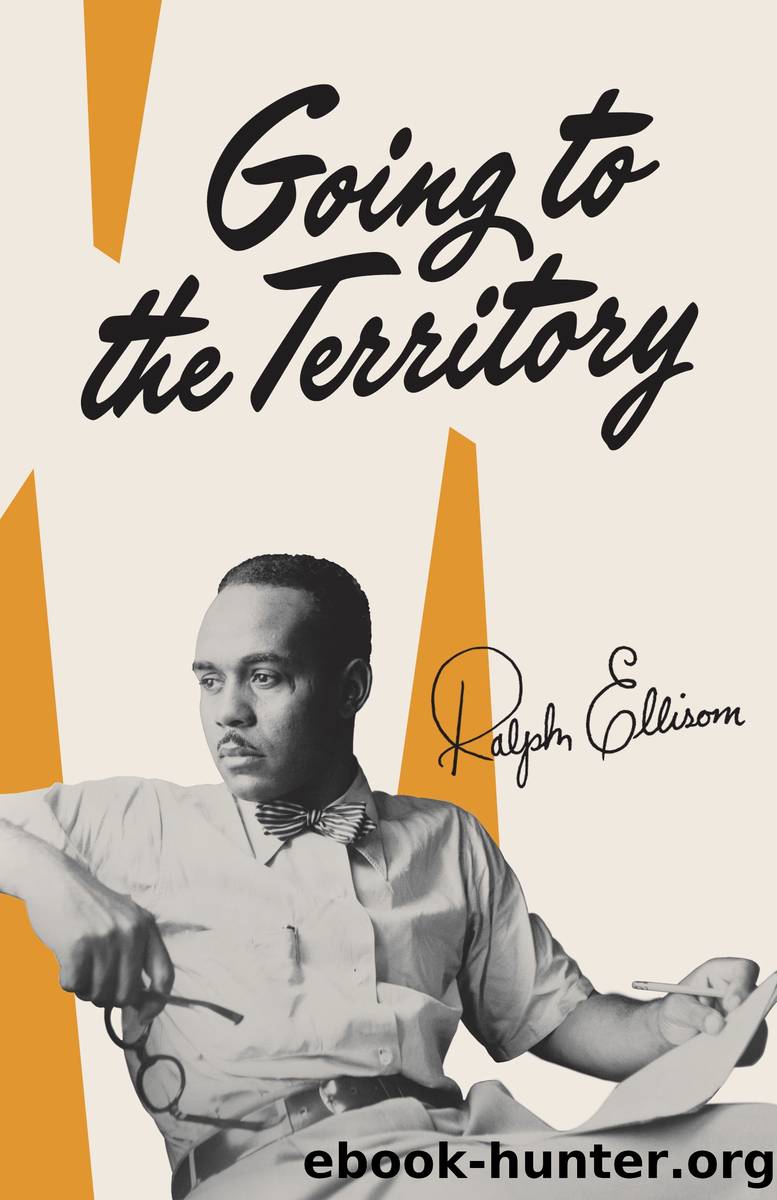Going to the Territory by Ralph Ellison

Author:Ralph Ellison [Ellison, Ralph]
Language: eng
Format: epub
ISBN: 978-0-307-79738-4
Publisher: Knopf Doubleday Publishing Group
Published: 2011-06-01T00:00:00+00:00
Remembering
Richard Wright
Earlier today while considering my relationship with Richard Wright, I recalled Heraclitusâ axiom âGeography is fate,â and I was struck by the ironic fact that in this country, where Frederick Jackson Turnerâs theory of the frontier has been so influential in shaping our conception of American history, very little attention has been given to the role played by geography in shaping the fate of Afro-Americans.
For example, Wright was a Mississippian who migrated to Chicago and then to New York. I, by contrast, am an Oklahoman and by geographical origin a Southwesterner. Wright grew up in a part of what was the old Confederacy, while I grew up in a state which possesses no indigenous tradition of chattel slavery. Thus, while we both grew up in segregated societies, mine lacked many of the intensities of custom, tradition, and manners which âcoloredâ the institutions of the Old South, and which were important in shaping Wrightâs point of view. Both of us were descendants of slaves, but since my civic, geographical, and political circumstances were different from those of Mississippi, Wright and I were united by our connection with a past condition of servitude, and divided by geography and a difference of experience based thereupon. And yet it was that very difference of experience and background which had much to do with Wrightâs important impact upon my sensibilities.
And then there was New York. I met Wright there in 1937, and it was no accidental encounter. It came about because through my reading and working in the library at Tuskegee Institute, Iâd become fascinated by the exciting developments that were taking place in modern literature. Somehow in my uninstructed reading of Eliot and Pound, I had recognized a relationship between modern poetry and jazz music, and this led me to wonder why I was not encountering similar devices in the work of Afro-American writers. Indeed, such reading and wondering prepared me not simply to meet Wright, but to seek him out. It led, in other words, to a personal quest. I insist upon the âseeking outâ because, you see, I too have an ego and it is important to me that our meeting came about through my own initiative. For not only is it historically true, but it has something to do with my being privileged to be here on what I consider to be a very important moment in the history of our literature. Perhaps Richard Wright would have dismissed such a moment as impossible, even as late as 1957, but still, here we are, gathered in the hot summertime to pay him honor. I would not have been surprised, since it was my reading of one of Wrightâs poems in the New Masses which gave me a sense of his importance. I had arrived in New York on July 5, 1936âa date of no broad symbolic importance, but one highly significant to me because it made a meeting with Wright a possibility. For although the New Masses poem was not a
Download
This site does not store any files on its server. We only index and link to content provided by other sites. Please contact the content providers to delete copyright contents if any and email us, we'll remove relevant links or contents immediately.
| Diaries & Journals | Essays |
| Letters | Speeches |
The Rules Do Not Apply by Ariel Levy(4941)
Bluets by Maggie Nelson(4534)
Too Much and Not the Mood by Durga Chew-Bose(4319)
Pre-Suasion: A Revolutionary Way to Influence and Persuade by Robert Cialdini(4195)
The Motorcycle Diaries by Ernesto Che Guevara(4069)
Walking by Henry David Thoreau(3939)
Schaum's Quick Guide to Writing Great Short Stories by Margaret Lucke(3362)
What If This Were Enough? by Heather Havrilesky(3297)
The Daily Stoic by Holiday Ryan & Hanselman Stephen(3287)
The Day I Stopped Drinking Milk by Sudha Murty(3180)
The Social Psychology of Inequality by Unknown(3009)
Why I Write by George Orwell(2933)
Letters From a Stoic by Seneca(2779)
A Short History of Nearly Everything by Bryson Bill(2675)
A Burst of Light by Audre Lorde(2582)
Insomniac City by Bill Hayes(2533)
Feel Free by Zadie Smith(2466)
Upstream by Mary Oliver(2377)
Miami by Joan Didion(2354)
